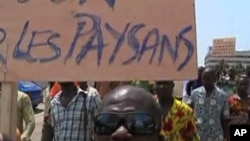As the political impasse persists in divided Ivory Coast, the West African country, which was once the region's economic powerhouse, faces further decline. Residents, diplomats, and analysts are very worried about the situation.
At a recent protest, Ivorian farmers complained about an ongoing cocoa embargo by major foreign export companies. One of the protestors said Ivorians need cocoa money to survive.
Other hardships facing Ivorians include shortages in cooking gas and rising prices on food markets. Mechanic Lamine Sylla has been doing work for government officials, but he says he has not been paid in several months.
"If you work for the government, all the money has been trapped," said Sylla. "You can no longer get paid."
Many banks are now shut down, while companies are laying off employees as outside economic sanctions against disputed incumbent President Laurent Gbagbo stiffen. Mr. Gbagbo has refused to cede power following controversial elections last year despite repeated mediation attempts.
The United Nations, African groupings and most countries recognize Mr. Gbagbo's challenger Alassane Ouattara as the winner of last year's presidential election.
Cocoa is the area where sanctions have been most felt, both inside and outside Ivory Coast.
Jean-Marc Anga is the executive director of the London-based International Cocoa Organization. "As you know Cote d'Ivoire is a leading cocoa producer in the world with close to 30 to 40 percent of world supply so in the cocoa sector if anything happens in the Cote d'Ivoire it is a matter of concern for us," said Anga.
Cocoa has always been crucial in the history of Ivory Coast. After independence from France in 1960, the country's economic success story was mostly built on the lucrative bean, which is used to make chocolate.
But many cocoa laborers, who originally came from neighboring countries, and their descendants, increasingly felt marginalized. This contributed to a rebellion in 2002 which split Ivory Coast in two.
Africa analyst with British-based Chatham House Paul Melly recently told a gathering of students in Washington that while other West African countries have had economic growth in recent years, Ivory Coast has faced a steady decline.
"Cote d'Ivoire, the great success story has spent a decade stagnating, caught between civil war and this sort of peace that barely functions with interminable political wrangling and consequently an almost total absence of long term government strategy," said Melly.
In addition to economic pressure against Mr. Gbagbo, some countries, like the United States, have started recognizing ambassadors appointed by Mr. Ouattara.
Daouda Diabate, the new ambassador in Washington, was recently welcomed by Ivorian immigrants.
He says he believes as soon as Mr. Gbagbo leaves power, economic problems will be resolved. "Cote d'Ivoire used to be qualified as an economic miracle in Africa and this is the kind of thing that we know that once again we can achieve," said Gbagbo. "We have the people. We have the resources. We have the opportunities. We just need peace and stability and we just want to see the right man at the right place do the job."
Mr. Ouattara is a former international banker, while Mr. Gbagbo is a former history professor.
The incumbent president and his supporters say they are fighting for a second independence to fully assume sovereignty from external actors, including economic ones. But their opponents say they are sacrificing the livelihood of all Ivorians and refusing to accept they lost the elections.

















